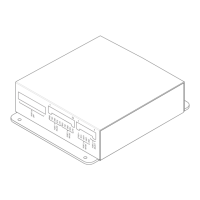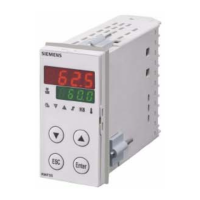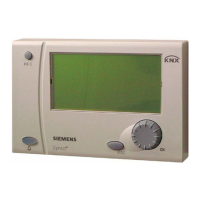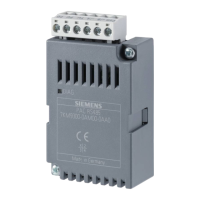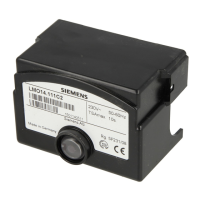66/126
Siemens Building Technologies Basic documentation RVD240 CE1P2384en
HVAC Products 16 D.h.w. heating 27.05.2004
For operating lines, settings and additional explanations, refer to chapter 18 "Function
block Valve actuator d.h.w.".
16.3.3 Protection against cooling down
Protection against cooling down is available with plant types that provide direct d.h.w.
heating (plant types x–4). It is used to prevent the primary side of the d.h.w. heat ex-
changer from cooling down. There is a risk of cooling down (leading to long waiting
times when d.h.w. is needed) when, during longer periods of time,
• no heat is required for space heating, and
• no d.h.w. is consumed
Protection against cooling down is only active in d.h.w. heating mode (d.h.w. release
given, holiday function not active).
Adjustable on operating line 192 is the waiting time, that is, the period of time between
two valve opening actions. The following settings are fixed:
• Opening time: 30 seconds
• Stroke: 25 %
• Switch-off temperature (only if sensor is present); it lies 5 °C below the d.h.w. set-
point
Depending on the type of plant, the temperature for the cooling down protection is ac-
quired as follows:
• Plant type 1–4: With return sensor B71 in the primary d.h.w. return
• Plant type 4–4: With return sensor B72 in the primary d.h.w. return
This means that only one sensor is required for the maximum limitation of the return
temperature and the cooling down protection. But the function can also be provided
without using a sensor.
Cooling down is prevented by primary valve Y5 in the primary d.h.w. return, which
opens at regular intervals based on fixed settings. This takes place when
• there was no demand for heat during the waiting time (neither for space heating nor
for d.h.w.)
• the waiting time has elapsed
Protection against cooling down will close the valve again:
• Without sensor: On completion of the opening time
• With sensor:
when the return temperature is higher than the switch-off temperature, or after
4 minutes
The function will be stopped prematurely when
• the flow switch delivers a signal, or
• the heating circuit or d.h.w. circuit calls for heat
If required, the protection against cooling down can be deactivated (entry --- on operat-
ing line 192).
16.3.4 Siting the sensors
Special attention must be paid to the correct location of the sensors. If no flow switch is
used, it must be made certain that the flow sensor immerses into the heat exchanger.
If the flow sensor is not correctly sited, there is a risk of excessive heat exchanger
temperatures. With these types of plant, d.h.w. can continually be heated, but the cir-
culating pump runs only when released!
General
Prerequisites
Mode of operation
Caution
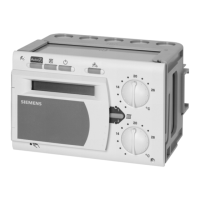
